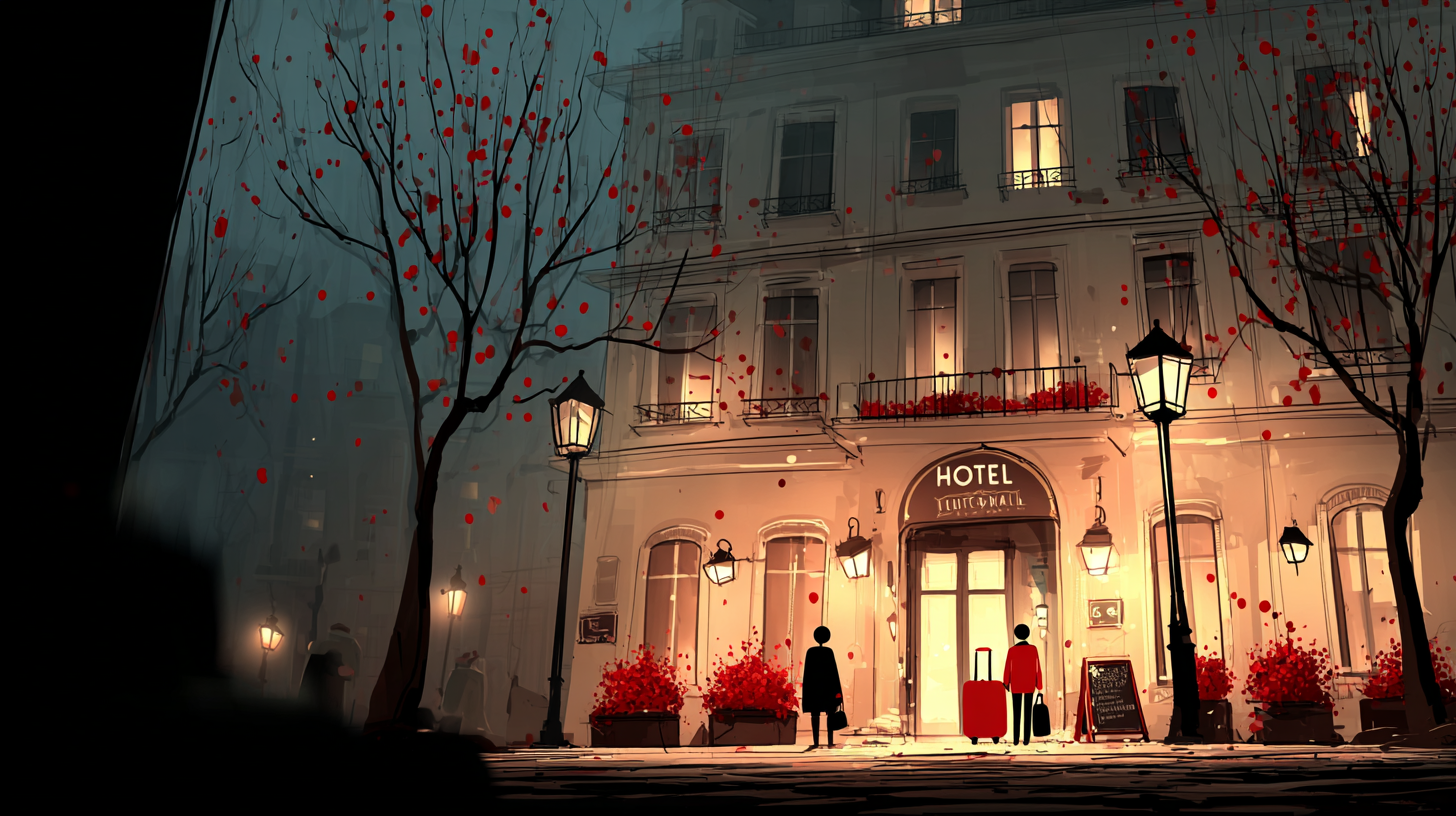A place where travelers can sleep and stay
旅行者が泊まる建物
以下は英単語 “hotel” に関するストーリー型学習コンテンツです。まずは大枠の意味を理解して最後の文章で確認しましょう。
主な意味(main meaning)
| 品詞 | 発音記号 (IPA) | 意味(簡潔) | 例文 |
|---|---|---|---|
| noun | /hoʊˈtɛl/ | 旅行者や客が泊まれる建物 | We stayed at a hotel near the beach. |
語源(etymology)
フランス語 “hôtel”(もとは大きな家・宿を意味)から英語へ。
核イメージは「人が泊まるために整えられた場所」。
類義語(synonyms)
| 類義語 | 意味 | 例文 |
|---|---|---|
| inn | 小さな宿 | The old inn had a warm fireplace. |
| motel | 車で泊まる宿 | We stopped at a motel on our road trip. |
| lodge | 山や自然の近くの宿 | They stayed in a lodge by the lake. |
| guesthouse | 小規模の宿泊施設 | We found a cheap guesthouse downtown. |
反義語(antonyms)
| 反義語 | 意味 | 例文 |
|---|---|---|
| home | 自分の家 | After traveling, I felt happy to be back home. |
| street | 野外・宿無しの状態 | Without money, he had to sleep on the street. |
コロケーション(collocations)
| コロケーション | 例文 |
|---|---|
| luxury hotel | They booked a luxury hotel for their honeymoon. |
| hotel room | Our hotel room had a great view of the city. |
| hotel staff | The hotel staff were very kind and helpful. |
| hotel reservation | I made a hotel reservation online. |
| hotel lobby | We met our friends in the hotel lobby. |
2項表現(binomials)
| 2項表現 | 例文 |
|---|---|
| bed and breakfast | We stayed at a small bed and breakfast in the countryside. |
| food and lodging | The tour includes food and lodging. |
英語ストーリー(english story)
Tom was a university student who had always dreamed of traveling abroad. During his summer vacation, he planned a trip to France. Since it was his first trip to Europe, he wanted everything to be perfect. He decided to book a hotel near the Eiffel Tower because he thought it would be convenient.
When Tom arrived in Paris, he was surprised by the friendly hotel staff. They helped him carry his luggage and gave him a map of the city. His hotel room was on the 10th floor, and from the window, he could see the sparkling lights of the Eiffel Tower at night.
One evening, he met another traveler in the hotel lobby. The traveler told him about a cheap guesthouse outside the city, but Tom was happy with his choice. “A luxury hotel like this is expensive,” Tom thought, “but it makes my trip special.”
The next day, Tom went on a bus tour. The guide explained that in the past, many travelers stayed at small inns or lodges when they visited the countryside. Today, however, most people prefer modern hotels.
During the tour, Tom heard a funny story. A man once forgot his hotel reservation and had to sleep on the street because all the hotels were full. “That’s terrible,” Tom thought, “I’m glad I made a reservation early.”
At the end of his trip, Tom also spent one night in a bed and breakfast in a small town. It was cozy and warm, quite different from the big hotel in Paris. He realized that both food and lodging are important for travelers, no matter where they go.
When Tom finally returned home, he felt tired but happy. He learned that whether you stay at a big hotel, a small guesthouse, or a mountain lodge, the most important thing is to enjoy the journey.
和訳
トムは大学生で、ずっと海外旅行を夢見ていました。夏休みにフランス旅行を計画しました。初めてのヨーロッパ旅行だったので、すべてを完璧にしたいと思いました。そこで彼はエッフェル塔の近くにホテル (hotel: ホテル) を予約しました。便利だと考えたからです。
パリに到着すると、トムはフレンドリーなホテルスタッフ (hotel staff: ホテルの従業員) に驚きました。彼らは荷物を運んでくれ、街の地図を渡してくれました。彼のホテルの部屋 (hotel room: ホテルの部屋) は10階にあり、窓から夜のエッフェル塔の輝く光が見えました。
ある晩、彼はホテルのロビー (hotel lobby: ホテルのロビー) で他の旅行者と出会いました。その旅行者は街の外にある安いゲストハウス (guesthouse: 小規模の宿泊施設) を教えてくれましたが、トムは自分の選択に満足していました。「こんな高級ホテル (luxury hotel: 高級ホテル) は高いけど、旅を特別にしてくれる」と思いました。
翌日、トムはバスツアーに参加しました。ガイドは、昔は多くの旅行者が田舎に行くと小さな宿屋 (inn: 小さな宿) やロッジ (lodge: 山の宿) に泊まったと説明しました。しかし今では、多くの人が現代的なホテルを好みます。
ツアーの途中、トムは面白い話を聞きました。ある男性はホテル予約 (hotel reservation: ホテル予約) を忘れてしまい、ホテルが満室だったため路上 (street: 路上) で寝なければならなかったそうです。「それはひどい」とトムは思いました。「早めに予約してよかった。」
旅の終わりに、トムは小さな町でベッド&ブレックファスト (bed and breakfast: 朝食付き宿泊施設) に1泊しました。そこは居心地がよく、パリの大きなホテルとは全く違いました。彼は、どこに行っても旅行者にとって食事と宿泊 (food and lodging: 食事と宿泊) が大切だと気づきました。
そして最後に家 (home: 家) に帰ったとき、彼は疲れていましたが幸せでした。大きなホテルでも、小さなゲストハウスでも、山のロッジでも、大切なのは旅を楽しむことだと学びました。
Q&A
Q: hotel と inn はどう違いますか?
A: hotel は都会や観光地にある大きな宿泊施設で、レストランやサービスが整っています。inn は田舎や小さな町にあることが多く、より小規模で家庭的な雰囲気があります。
Q: hotel と motel の違いは?
A: hotel は観光やビジネス客が利用する多階建ての宿泊施設です。motel は「motor + hotel」から来ていて、車で旅行する人向けに部屋の前に駐車場があるのが特徴です。
Q: hotel と lodge の違いは?
A: hotel は都市や観光地で利用されることが多いのに対し、lodge は山や湖など自然の近くにある宿泊施設で、アウトドア旅行で使われやすいです。
Q: hotel と guesthouse の違いは?
A: hotel は規模が大きく、設備やサービスが充実しています。guesthouse は小規模で料金も安め、家のようにアットホームな雰囲気が特徴です。
Q: luxury hotel とはどんなものですか?
A: luxury hotel は高級ホテルのことで、部屋や設備が豪華で、サービスも特別に丁寧です。料金は高めですが快適さが魅力です。
Q: hotel room とは普通の「部屋」とどう違いますか?
A: room だけだとどんな部屋かは分かりませんが、hotel room というと「ホテルにある宿泊用の部屋」を指します。
Q: hotel staff は他の staff と何が違いますか?
A: staff は「従業員」を意味しますが、hotel staff と言えばホテルで働く人々(受付、清掃、ベルボーイなど)を指します。
Q: hotel reservation と普通の reservation の違いは?
A: reservation は「予約」全般ですが、hotel reservation は「ホテルの予約」に特化しています。
Q: hotel lobby とは?
A: lobby は建物の入り口近くの広い空間です。hotel lobby はホテルの入口付近にある待合スペースで、チェックインや待ち合わせによく使われます。
Q: bed and breakfast はホテルとどう違いますか?
A: bed and breakfast (B&B) は小さな宿泊施設で、部屋と朝食がセットになっています。大きなホテルのようなサービスは少ないですが、家庭的で温かい雰囲気があります。
Q: food and lodging の「lodging」は hotel と同じ意味ですか?
A: lodging は「宿泊施設」を広く指す言葉です。hotel も lodging の一種ですが、lodge、inn、guesthouse なども lodging に含まれます。



コメント